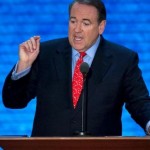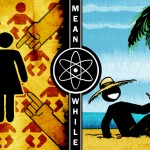Each Friday in Not Fit for Dinner, C. Ryan Knight explores political issues and the preconceptions guiding our understanding of and responses to them.
By many accounts, one of the primary goals of this year’s Republican National Convention was to re-introduce Mitt Romney to his own party, and America at large, in an attempt to increase the likelihood of his being elected to the White House.
In trying to cast Romney in a new light, some speakers have carefully broached the waters of Romney’s Mormon faith. Mrs. Romney remembered the start of her love for Romney and said this: “When Mitt and I met and fell in love, we were determined not to let anything stand in the way of our life together. I was an Episcopalian. He was a Mormon.” She quickly pivoted to another obstacle—their youth and their youthful haste into marriage—to their being together.
Following behind Mrs. Romney, FOX News host and Southern Baptist Mike Huckabee offered an explanation for evangelicals to embrace Romney yesterday:
People wonder whether guys like me, an evangelical, would only support a fellow evangelical? Well my friends I want to tell you something, of the four people on the two tickets, the only self-professed evangelical is Barack Obama. And he supports changing the definition of marriage. [He] believes that human life is disposable and expendable at any time … And he tells people of faith that they have to bow their knees to the God of government and violate their faith and conscience in order to comply with what he calls, health care. Friends[,] I know we can do better.
Huckabee has a point, though how he reaches it is dubious. He tries to argue that President Obama only pays lip-service to Christianity and supports what are generally considered anti-biblical measures like abortion. (Never mind that there is a small but present minority of Christians who make a case for same-sex marriage and/or abortion.) So the President is out. That leaves Romney, and we have to pick someone, so it has to be Romney since he at least believes in biblical values, even if he arrives at them from a different religious path.
The last excerpted sentence from Huckabee’s speech (see above) is telling, for earlier in his speech he explicitly states that his assigned task is to touch on the week’s themes, “We Can Do Better.” The point to be made here is this: Protestant Republicans are accepting a Mormon as a Presidential candidate not based on renewed study of Mormonism and acceptance of it as doctrinally sound but merely based on pragmatic political reasons. No doubt this decision makes sense politically, but it is severely lacking from a theological and doctrinal standpoint.
By no means is Huckabee the first to make this pragmatic shift. During the GOP race for the party nomination, Texas pastor Robert Jeffress initially spoke out against Romney, claiming Romney is “not a Christian,” and that he could not support someone involved with a cult to become America’s president. But this past April, when Romney’s winning the party nomination became all but certain, Jeffress changed his position; he now supports Romney “in spite of his Mormon faith.”
Not all Christians are willing or able to overlook theological disagreements with Mormonism, though, or to move past them as Jeffress has. Earlier this week, prominent evangelical Carson T. Clark dug in against voting for a Mormon, worrying that “conservative Christians are unknowingly opening Pandora’s box” by voting for a Mormon. Last year, Warren Cole Smith, Associate Publisher of WORLD Magazine, argued electing a Mormon as President would be an implicit, if not explicit, “promotion” of Mormonism.
Image Credit: Carson T. Clark — http://carsontclark.com/
Clark and Smith’s views, once majority opinion amongst evangelicals, is now minority opinion. But their arguments raise an important point: the acceptance of a Mormon candidate is momentous because it is a sharp departure from the typical emphasis evangelicals place upon theological and doctrinal soundness.
There is much talk about Romney’s biblical stances on popular social issues, but very little about Mormonism’s rejection of major theological concepts evangelicals traditionally hold dear (the nature of God’s existence and Christ’s divinity, as well as less central issues like celestial marriage). Where theological objections do exist (as with Jeffress), they take the back seat, presumably because the more important goal is to get a conservative with traditional social values into the White House.
To be clear, I do not agree with the basic conclusions Clark and Smith make. But writers like Clark and Smith call us to pay attention to the shift in Americans and evangelicals’ attitude toward Mormonism. Take, for instance, the claim one of Pat Robertson’s spokespersons, that “Romney’s Mormonism is no longer an issue, so it’s a fairly level playing field.” It’s a claim reached at by the same criss-cross logic Huckabee used.
But to say Romney’s Mormonism is no longer an issue is only a half-truth. Politically speaking, it no longer is. That much is for sure after this week’s Republican National Convention. Yet Romney’s Mormonism still is (or should be) a doctrinal issue until evangelicals’ relationship with and attitude toward Mormonism is thoroughly re-evaluated and adjusted. And if this evolving shift from concern over doctrine to concern over politics and broad conservative social issues, we are witnessing a significant act of re-prioritizing what’s most important to evangelicals. This is no doubt bound to have far-reaching implications that remain to be seen.












